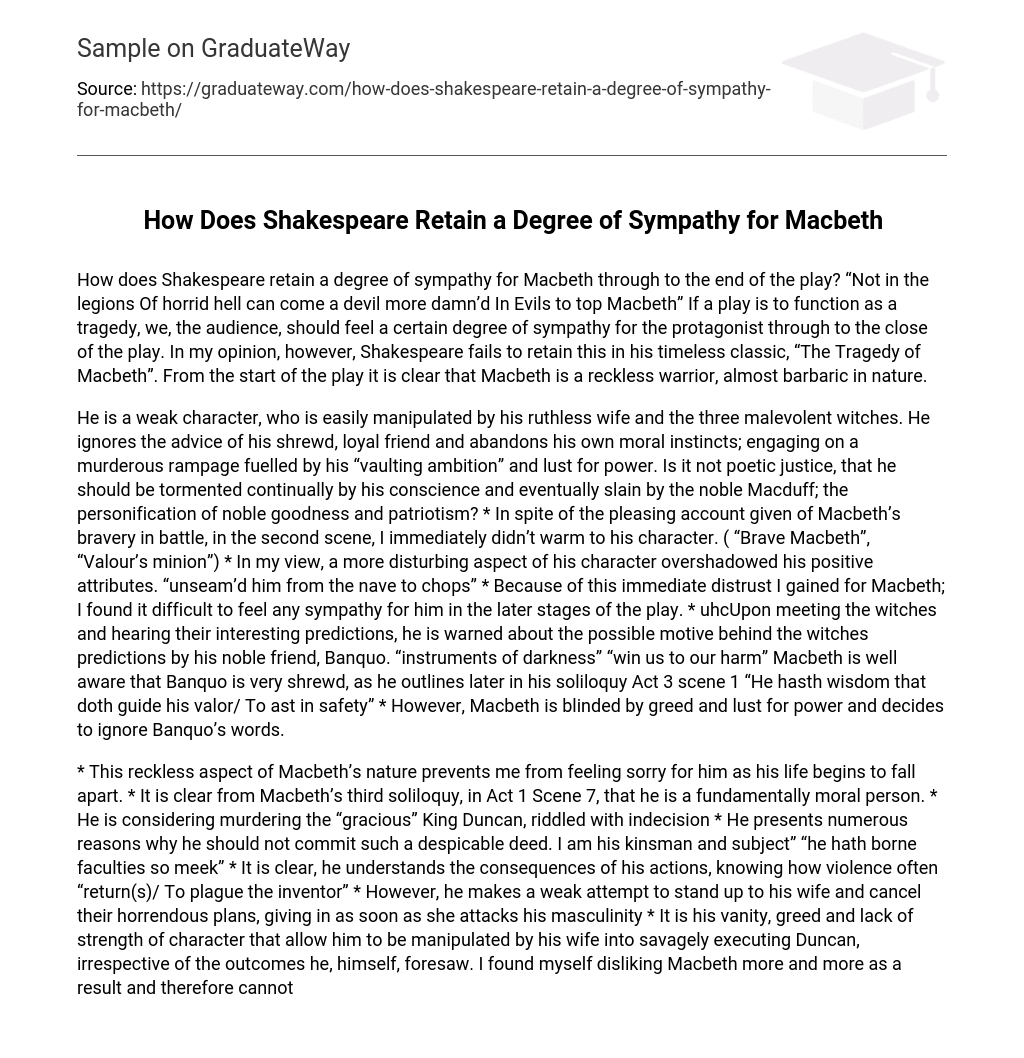How does Shakespeare retain a degree of sympathy for Macbeth through to the end of the play? “Not in the legions Of horrid hell can come a devil more damn’d In Evils to top Macbeth” If a play is to function as a tragedy, we, the audience, should feel a certain degree of sympathy for the protagonist through to the close of the play. In my opinion, however, Shakespeare fails to retain this in his timeless classic, “The Tragedy of Macbeth”. From the start of the play it is clear that Macbeth is a reckless warrior, almost barbaric in nature.
He is a weak character, who is easily manipulated by his ruthless wife and the three malevolent witches. He ignores the advice of his shrewd, loyal friend and abandons his own moral instincts; engaging on a murderous rampage fuelled by his “vaulting ambition” and lust for power. Is it not poetic justice, that he should be tormented continually by his conscience and eventually slain by the noble Macduff; the personification of noble goodness and patriotism?
In spite of the pleasing account given of Macbeth’s bravery in battle, in the second scene, I immediately didn’t warm to his character. ( “Brave Macbeth”, “Valour’s minion”). In my view, a more disturbing aspect of his character overshadowed his positive attributes. “unseam’d him from the nave to chops”. Because of this immediate distrust I gained for Macbeth; I found it difficult to feel any sympathy for him in the later stages of the play. uhcUpon meeting the witches and hearing their interesting predictions, he is warned about the possible motive behind the witches predictions by his noble friend, Banquo. “instruments of darkness” “win us to our harm” Macbeth is well aware that Banquo is very shrewd, as he outlines later in his soliloquy Act 3 scene 1 “He hasth wisdom that doth guide his valor/ To ast in safety”
However, Macbeth is blinded by greed and lust for power and decides to ignore Banquo’s words. This reckless aspect of Macbeth’s nature prevents me from feeling sorry for him as his life begins to fall apart. It is clear from Macbeth’s third soliloquy, in Act 1 Scene 7, that he is a fundamentally moral person. He is considering murdering the “gracious” King Duncan, riddled with indecision. He presents numerous reasons why he should not commit such a despicable deed. I am his kinsman and subject” “he hath borne faculties so meek”.
It is clear, he understands the consequences of his actions, knowing how violence often “return(s)/ To plague the inventor”. However, he makes a weak attempt to stand up to his wife and cancel their horrendous plans, giving in as soon as she attacks his masculinity. It is his vanity, greed and lack of strength of character that allow him to be manipulated by his wife into savagely executing Duncan, irrespective of the outcomes he, himself, foresaw. I found myself disliking Macbeth more and more as a result and therefore cannot bring myself to feel sympathy for him.
Following the murder of King Duncan, Macbeth descends into a rapid moral decline. He loses respect for himself as feels he has sold his soul to the devil, “Mine eternal jewel/ Given to the common enemy of man”. He becomes completely consumed with retaining his power, “To be tus is nothing, but to be safely thus”. He harshly orders the murder of his once dear friend Banquo and his son.
Then we witness the heinous slaughter of Macduff’s innocent wife and young children. Macbeth devolves into a reviled tyrant, hated and feared by all his countrymen and women “each new morn/ new widows howl”. Scottish society is left in utter chaos due to Macbeth’s irrational, inconceivable actions. Macbeth’s shocking actions appall me, causing me to look forward to despise him as a character * Through his soliloquy’s, we gain an insight into Macbeth’s tortured mind. “Will all Neptune’s seas wash this blood clean from my hand? No…”
It appears after committing his first horrible act, Macbeth is continually haunted and tormented with inner conflict. * He is no longer able to sleep, “Macbeth doth murder sleep”. However, I did not pity him in the slightest because, I believe his met the comeuppance for his evil deeds. Through his soliloquys and otherwise, Shakespeare provides a vivid insight into Macbeth’s tortured mind. He is completely overcome by guilt, “Will all Neptune’s oceans wash this blood clean from my hand? /No…” and then paranoia.
It appears, following his first vile act, he is continually haunted and tormented with inner conflict. He was unable to sleep, “Macbeth doth murder sleep”. However, I do not feel pity towards him as he foresaw this and I believe it is a suitable comeuppance for his disgraceful evil deeds. Upon witnessing the noble Macduff slay him in the penultimate scene, I feel that appropriate justice is served and am satisfied that goodness conquers over evil. “My way of life Hath fallen into the sear … And that which should accompany old age … I must not look to have. ”





